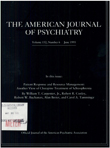Quality of life and dissociation in anxiety disorder patients with histories of trauma or PTSD
Abstract
OBJECTIVE: The purpose of this analysis was to examine quality of life and dissociation in anxiety disorder subjects with histories of trauma, some of whom met criteria for posttraumatic stress disorder (PTSD). METHOD: Subjects came from a prospective, longitudinal study of anxiety disorders. Information was gathered on role, social life, suicide attempts, psychiatric hospitalization, alcohol and substance abuse, depression, and dissociation. RESULTS: Subjects with PTSD had the worst functioning on all of the measures examined except social life. Those with histories of trauma but no PTSD differed from subjects who reported no history of trauma, primarily in high rates of alcoholism and minor depression. CONCLUSIONS: PTSD has severe effects on quality of life in virtually all spheres of life. The high levels of depression, suicide attempts or gestures, and alcohol abuse are of particular concern and show that trauma can have long-lasting effects.
Access content
To read the fulltext, please use one of the options below to sign in or purchase access.- Personal login
- Institutional Login
- Sign in via OpenAthens
- Register for access
-
Please login/register if you wish to pair your device and check access availability.
Not a subscriber?
PsychiatryOnline subscription options offer access to the DSM-5 library, books, journals, CME, and patient resources. This all-in-one virtual library provides psychiatrists and mental health professionals with key resources for diagnosis, treatment, research, and professional development.
Need more help? PsychiatryOnline Customer Service may be reached by emailing [email protected] or by calling 800-368-5777 (in the U.S.) or 703-907-7322 (outside the U.S.).



